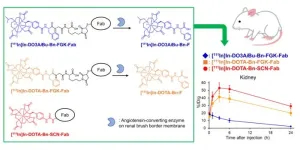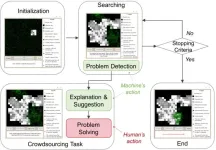(Press-News.org) Patients with acute myeloid leukemia (AML) who received vitamin C and D supplements while undergoing intensive chemotherapy had lower rates of complications, such as infections, bleeding, and inflammation, when compared with similar, previously treated patients who did not receive these supplements. Moreover, while the study showed no difference in survival between the two groups, a subgroup analysis showed that among patients with a genetic mutation known as NPM1 – found in about one in three patients with AML – the risk of death was nearly 50% lower among those who were taking the supplements. The results published today in the journal Blood Advances.
“To the best of our knowledge, this is the first study to examine the potential effects of vitamin C and D supplementation during intensive chemotherapy for AML,” said Christian Récher, MD, of the University Cancer Institute of Toulouse in France and the study’s senior author. “We have shown that supplementation is feasible and safe and may help reduce some significant adverse events associated with intensive chemotherapy, which is a clear benefit for patients.”
Dr. Récher and his colleagues began treating all adult patients with AML undergoing intensive chemotherapy with vitamin C and D supplements, based on the findings of several previous studies. One of these studies suggested that higher vitamin D levels prior to a donor stem cell transplant reduced the risk of a post-transplant relapse in patients with AML, while two laboratory studies indicated that vitamin C supplementation could suppress the development of leukemic cells.
In this study, the researchers compared outcomes for 431 patients with AML who received intensive chemotherapy at the University Cancer Institute of Toulouse over a five-year period; 169 patients, treated between 2018 and 2020, received vitamin C and D supplements while 262, treated between 2015 and 2018 (the control group), did not. ADD statement/info on response potentially including reduced side effects.
The median age of patients in the supplementation group was 65 and 52% were women, while in the control group, the median age was 60 and 53% were men. At the time of their AML diagnosis, most patients in both groups had low levels of vitamins C and D. Roughly a quarter of patients in the supplementation group and a third of those in the control group went on to receive donor stem cell transplants. The median follow-up period was 28.7 months for the supplementation group and 58.2 months for the control group.
In the supplementation group, vitamin D levels increased significantly from 18 ng/mL at diagnosis to 39 ng/mL at recovery from intensive chemotherapy. The normal range for vitamin D is between 20 and 50 ng/mL No significant increase was seen in vitamin C levels likely due to a conservative regimen (6 grams per week).
During intensive chemotherapy, patients receiving the supplementation experienced lower rates of moderate to severe bacterial infections (27.2% versus 35.1% in the control), bleeding (1.8% versus 5.7% in the control), and potentially life-threatening inflammation of the immune system (1.8% versus 8.8% in the control). Median overall survival was 34.5 months, median survival without a relapse was 20.6 months, and the cumulative incidence of relapse was 46.4%. No significant differences between the two groups were observed when the researchers analyzed outcomes for all treated patients combined.
However, a subgroup analysis found that patients in the supplementation group with an NPM1 mutation – the most common mutation found in 30% to 35% of patients with AML – had a 48% reduced risk of death compared with patients who did not have the mutation. Further studies are needed to identify the mechanism responsible for this survival difference, Dr. Récher said.
Dr. Récher and his team were especially surprised by the improved survival in patients with an NPM1 mutation who received the supplements but cautioned that this association requires confirmation in a larger, randomized study.
The study has several limitations. It was a retrospective study conducted at a single institution that compared outcomes for patients treated before and after the institution introduced supplementation for all adult patients undergoing intensive chemotherapy for AML. The study also involved a relatively small number of patients. Additionally, because all patients in the supplementation group received both vitamin C and vitamin D, the researchers could not analyze the independent effect of each vitamin or the value of combining them.
Despite these limitations, Dr. Récher said, “Our results are encouraging and support prospective clinical trials of vitamin C and D administration in AML patients.”
As always, patients should review with their care teams the medications they take, including any over-the-counter medications, vitamin and dietary supplements, and ask before starting specific supplements.
# # #
Blood Advances (www.bloodadvances.org) publishes more peer-reviewed hematology research than any other academic journal worldwide and is an online only, open access journal of the American Society of Hematology (ASH), the world’s largest professional society concerned with the causes and treatment of blood disorders.
Blood Advances® is a registered trademark of the American Society of Hematology.
Contact:
Kira Sampson, American Society of Hematology
ksampson@hematology.org; 202-499-1796
END
Thirteen-year-old Grace Hoyt received potentially the best birthday gift ever this month when pediatric ophthalmologists at the University of Colorado School of Medicine and Children’s Hospital Colorado administered the first treatment designed specifically to slow her vision loss associated with posterior column ataxia with retinitis pigmentosa (PCARP), a rare genetic condition that affects vision and the nervous system.
“It’s so incredible that she has this opportunity,” Susan Hoyt says of her daughter, who received the first treatment Aug. 24. “We’ve known that Grace is going to go blind, but to have ...
Radiotheranostics embodies the convergence of diagnostic and therapeutic radiopharmaceuticals into a unified platform. In cancer treatment, radiotheranostic procedures typically involve the use of antibodies that bind to proteins abundantly found on the surface of cancerous cells. The antibodies are labeled with a suitable radioisotope, which facilitates imaging procedures used to diagnose cancer and can be used to target cancerous cells and bombard them with deadly radiation as a form of treatment.
Although radiolabeled antibodies show promise as a treatment for cancer, several hurdles impede their clinical translation. ...
For the 314,000 people diagnosed with ovarian cancer each year, hope often comes in the form of platinum-based drugs such as cisplatin.
Cisplatin causes the death of quick-dividing tumour cells, so it is a potent first-line defence in the treatment of the often fatal disease.
However, over half of ovarian cancer patients develop recurrence and become resistant to cisplatin and other platinum-based chemotherapies, contributing to the five-year survival rate of 31%.
It is unclear why this resistance occurs, but a solution is urgently ...
When artificial intelligence robots that have been designed to use algorithms to complete source search tasks, such as search and rescue operations during a fire, encounter a disturbance, they are often unable to complete their task. Proposed solutions have ranged from trying to improve algorithms to introducing additional robots, but these AI-driven robots still encounter fatal problems.
Researchers have proposed a solution: a human-AI collaboration that takes advantages of the unique skills of the human brain to overcome challenges.
The paper was published in the Journal of Social ...
A new physician-training system in telehealth simulates key parts of traditional, in-person neurological exams that use little reflex hammers, pinpricks, and flashlights to test nerve function. The three-year program, which was designed by researchers at NYU Grossman School of Medicine, has trained at least 68 neurology residents since its rollout in 2020. Published online Aug. 3 in Neurology Education, a new analysis of the curriculum identifies challenges to translating in-person exam techniques ...
Researchers from Texas Christian University, University of South Carolina, and RealPage published a new Journal of Marketing article that examines the impact of online reviews on hotel booking performance with a specific focus on the competitive effects of reviews.
The study, forthcoming in the Journal of Marketing, is titled “The Competitive Effects of Online Reviews on Hotel Demand” and is authored by Sanghoon Cho, Pelin Pekgun, Ramkumar Janakiraman, and Jian Wang.
Recent reports indicate that a majority of consumers trust online reviews as much as personal recommendations when deciding to book a hotel. A 2019 study ...
As drinking water flows through pipes and into a glass, it runs against the rubber seals inside some plumbing devices. These parts contain additives that contribute to their flexibility and durability, but these potentially harmful compounds can leak into drinking water, according to a small-scale study in ACS’ Environmental Science & Technology Letters. The authors report that the released compounds, which are typically linked to tire pollution, also transformed into other unwanted byproducts.
To enhance rubber’s strength and durability, manufacturers typically mix in additives. Scientists have shown that tire dust ...
The Icahn School of Medicine at Mount Sinai announced today that it has signed a memorandum of understanding with the Brazilian Clinical Research Institute (BCRI) to focus on advancing cardiovascular disease research, innovation, and medical education.
"This partnership is part of a broader initiative to expand Mount Sinai Heart’s reach globally, and Latin America is an important part of that goal," said Deepak L. Bhatt, MD, MPH, Director of Mount Sinai Heart and Dr. Valentin Fuster Professor of Cardiovascular Medicine at Icahn Mount Sinai. "Our partnership ...
As summer draws to a close, the long vines and tendrils of most melons and gourds in the Cucurbitaceae family snake their way along the ground. And they’re dotted with fruits, such as cucumbers or pumpkins. Below are some recent papers published in ACS journals that report insights into melons’ potential health impacts, pathogens and contaminants. Reporters can request free access to these papers by emailing newsroom@acs.org.
“Nanoparticles Loaded with a Carotenoid-Rich Extract from Cantaloupe Melon Improved Hepatic Retinol Levels in a Diet-Induced Obesity Preclinical Model”
ACS ...
Cambridge, MA (September 6, 2023) — The Broad Institute of MIT and Harvard today announced a new research alliance with Novo Nordisk aimed at addressing critical unmet clinical needs in diabetes and cardiometabolic diseases. The collaboration will focus on advancing three programs over the next three years. Two programs aim to identify drug targets for clinically important subtypes of type 2 diabetes, which affects more than 37 million people in the United States alone, and one program aims to unravel the genetic roots of cardiac fibrosis, or scarring of the heart, which occurs in many cardiovascular diseases that can lead to ...



